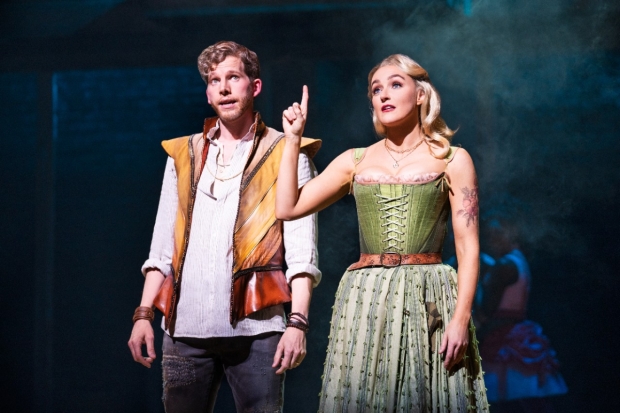Interview: David West Read Finds a Magic Comedic Formula in New Musical & Juliet
Read — an Emmy-winning writer on ”Schitt’s Creek” — discusses his Shakespeare-inspired Max Martin musical.
Comedy is hard, but making finding the story of a comedy out of a group of uncollected pop songs is even harder. But David West Read — known for making audiences laugh as an Emmy-winning writer on TV's Schitt's Creek and as the author of the notorious (and absolutely hilarious) Broadway flop The Performers — figured out a magic formula with & Juliet. Combining the beloved pop songs of Swedish hitmaker Max Martin with a revisionist take on Romeo and Juliet, the new musical, which hails from London's West End, is the most fun you'll have at the theater this season. And putting it together, for Read, was pretty delightful, too. Here, he tells us about his desire to give the audience the best possible time.

(© Natalia Dolan)
This conversation has been condensed and edited for clarity.
Knowing Max Martin has so many songs, where do you even start?
It really was making a playlist of the songs they gave me, which was hundreds of songs deep, and trying to absorb Max's incredible catalog and trying to find some commonality in the songs. Of course, so many of them are about young love and heartbreak. Because Max is this very humble Swedish person, he doesn't have a recognizable brand himself, so I was thinking about a brand that I could get without paying for it to use as a unifying force for all this music, and Shakespeare and Romeo and Juliet felt like a great fit.
Did Max give you carte blanche to do whatever you wanted?
You really don't know what it's going to be like when you start a project like this. Not knowing anything about Max, I just assumed that this would be a thing where he shows up on opening night but has no real involvement, because there are some shows where you feel like someone's just collecting checks. But he made it so clear from the beginning that he only wanted to do this if it felt like an interesting challenge and that he could help craft this thing together. The flip side of that is that he could pull the plug at any point, so there was a lot of pressure. He just wanted to make something that seemed fun and exciting.
But yeah, he gave me his catalog and never said, "You have to put this song in" or "You can't put that song in." The only time he would weigh in on something was when he felt like he wasn't really involved with the making of the original song. He has a writing credit on certain songs where he was just, like, in the room. There were certain things I pitched him where he'd say, "Yeah, I didn't even know I was a writer on that song." So everything that's in the musical is closer to his heart, and are songs that were really important to him.

(© Matthew Murphy)
My favorite joke in the show is the "It's gonna be May" payoff. What's yours?
You've kind of answered it for me. It's probably the slowest burn I've ever written. I love a really long payoff. I used to be really worried about spoilers, but then I realized there's immense satisfaction in people knowing something's coming and waiting and waiting and waiting for it, and then it finally comes and there's a huge release. I'm also a fan of Frankie saying "I did it my. way," because those are two things I've kind of retrofit, in terms of the name Frankie and the line "I did it my way." Those things really make me laugh.
Where does the show play better, New York or London?
Everything is better on Broadway. British audiences are very reserved and polite, and I would be sitting there, like, "You know this is a Backstreet Boys song, right? Have you heard this before?" People would sit there stone faced, but then at the end of the show, they'd explode and jump to their feet and go crazy. Oh, you we're enjoying it. I just didn't know that for the last two hours.
How has having gone from theater to television and now back to theater changed you as a writer?
I feel like I'm pretty much the same writer, but the world has changed a bit. Something I always struggled with in theater 10 years ago is that I make things that are audience friendly. I'm trying to make theater that's very accessible, and that kind of theater isn't celebrated. I love Neil Simon. When I was making The Performers, it was like, "Wouldn't it be great if there was a really funny play that you want to go to on a Friday night on a date?" When the New York Times review came out, they said "It's like an x-rated Neil Simon comedy." I was like "Oh, great!" and then I realized that it was very negative.
So much of the success of Schitt's Creek benefitted from the world being very dark and people wanting something uplifting and joyous. & Juliet is similar to that in that it really is full of heart and confetti cannons and is meant to give people a really great time for two and a half hours. If you're gonna spend that much money and sit in a theater with other humans breathing around you, people want to know that they're gonna have a great time. I think there's a little more openness to that now.

(© Matthew Murphy)








